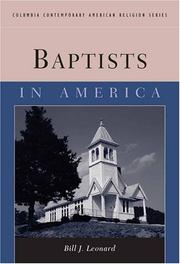| Listing 1 - 8 of 8 |
Sort by
|
Digital
Abstract | Keywords | Export | Availability | Bookmark
 Loading...
Loading...Choose an application
- Reference Manager
- EndNote
- RefWorks (Direct export to RefWorks)
Book
Year: 1941 Publisher: London : The Carey Press,
Abstract | Keywords | Export | Availability | Bookmark
 Loading...
Loading...Choose an application
- Reference Manager
- EndNote
- RefWorks (Direct export to RefWorks)
Digital
Year: 1820 Publisher: [England? s.n.
Abstract | Keywords | Export | Availability | Bookmark
 Loading...
Loading...Choose an application
- Reference Manager
- EndNote
- RefWorks (Direct export to RefWorks)
Digital
Year: 1815 Publisher: [England? s.n.
Abstract | Keywords | Export | Availability | Bookmark
 Loading...
Loading...Choose an application
- Reference Manager
- EndNote
- RefWorks (Direct export to RefWorks)

ISBN: 019535480X 0585325065 9780585325064 0195111451 0195075099 9780195075090 9780195111453 Year: 1993 Publisher: New York (N.Y.) Oxford university press
Abstract | Keywords | Export | Availability | Bookmark
 Loading...
Loading...Choose an application
- Reference Manager
- EndNote
- RefWorks (Direct export to RefWorks)
This book retraces the African origins of African-American forms of worship. During a five-year period in the field, Pitts played the piano at and recorded numerous worship services in black Baptist churches throughout rural Texas. His historical comparisons and linguistic analyses of this material uncover striking parallels between ""Afro-Baptist"" services and the religious rituals of Western and Central Africa, as well as other African-derived rituals in the United States Sea Islands, the Caribbean, and Brazil.
African American Baptists --- Blacks --- Public worship --- 286.1 --- Worship --- Church attendance --- Afro-American Baptists --- Baptists, African American --- Baptists, Negro --- Baptists --- 286.1 Baptisten. General Baptists. Particular Baptists. Mamillaren --- 286.1 Baptist Missionary Society --- Baptisten. General Baptists. Particular Baptists. Mamillaren --- Baptist Missionary Society --- Negroes --- Ethnology --- Religion --- Baptists&delete& --- History --- Black persons --- African American Baptists. --- Religion. --- History. --- Black people

ISBN: 1843831953 9786612080913 1282080911 1846154634 Year: 2006 Publisher: Woodbridge Boydell
Abstract | Keywords | Export | Availability | Bookmark
 Loading...
Loading...Choose an application
- Reference Manager
- EndNote
- RefWorks (Direct export to RefWorks)
This book challenges the orthodoxy that seventeenth-century Baptists were divided from the first into two separate denominations, 'Particular' and 'General', defined by their differing attitudes to predestination and the atonement, showing how the position was in fact much more complicated. It describes how from the foundation of the 'Generals' in 1609 there were always two tendencies, one clericalist and pacifist, influenced by the Dutch Mennonites, and one reflecting the English traditions of erastianism and local lay predominance in religion. It re-analyses the confessional struggle during and after the civil war, showing how Independent and erastian sentiment in Parliament increasingly combined to baulk Presbyterian ambition; during and partly because of this process (which they also influenced), the Baptists evolved into three recognisable tendencies. Amongst General Baptists there was a politically radical current, but also a more passive tendency which was starting to gain ground. In 1647-9 most but by no means all Particular Baptist leaders were hostile to the Levellers. The book looks at the nature of religious conviction in the New Model Army, reassessing the role and influence of Baptists in it. In the late 40s, many Baptists, soldiers and civilians, rejected formal ordinances altogether. STEPHEN WRIGHT received his Ph.D. from the University of London. He has been visiting lecturer at the University of Hertfordshire and the University of North London.
Baptists --- 286.1 --- 286.1 Baptisten. General Baptists. Particular Baptists. Mamillaren --- 286.1 Baptist Missionary Society --- Baptisten. General Baptists. Particular Baptists. Mamillaren --- Baptist Missionary Society --- Baptist Church --- Anabaptists --- History --- 17th-century Baptists. --- Baptist movement. --- Independent sentiment. --- Levellers. --- New Model Army. --- atonement. --- clericalism. --- confessional struggle. --- erastianism. --- formal ordinances. --- lay predominance. --- pacifism. --- predestination.

ISBN: 9789004478107 9789004107441 9004107444 Year: 1997 Publisher: Leiden; Boston : Brill
Abstract | Keywords | Export | Availability | Bookmark
 Loading...
Loading...Choose an application
- Reference Manager
- EndNote
- RefWorks (Direct export to RefWorks)
This volume of essays focuses on the thought of John Gill, the doyen of High Calvinism in the transatlantic Baptist community of the eighteenth and early nineteenth centuries. Among the topics covered are Gill's trinitarian theology, his soteriological views, his Baptist ecclesiology, and his use of Scripture. Other papers are more focused, examining, for instance, his clash with the Arminian Methodist leader John Wesley over the issues of predestination and election, a clash that decisively shaped Wesley's perspective on Calvinism. The tercentennial of Gill's birth in 1997 is a fitting occasion to issue this study of a man whose systematic theology and exposition of the Old and New Testaments formed the mainstay of many eighteenth-century Baptist ministers' libraries and who has never been the subject of a major critical study.
Reformed Baptists --- Clergy --- Doctrines --- History --- Baptists --- Reformed Baptists - Great Britain - Clergy - Biography. --- Reformed Baptists - Great Britain - Doctrines - History - 18th century. --- 286.1 --- 286.1 Baptisten. General Baptists. Particular Baptists. Mamillaren --- 286.1 Baptist Missionary Society --- Baptisten. General Baptists. Particular Baptists. Mamillaren --- Baptist Missionary Society --- Biography --- Gill, John --- Gill,

ISBN: 0231127022 132235300X 0231127030 0231501714 Year: 2005 Volume: *2 Publisher: New York (N.Y.) Columbia university press
Abstract | Keywords | Export | Availability | Bookmark
 Loading...
Loading...Choose an application
- Reference Manager
- EndNote
- RefWorks (Direct export to RefWorks)
Baptists are a study in contrasts. From Little Dove Old Regular Baptist Church, up a hollow in the Appalachian Mountains, with its 25-member congregation, to the 18,000-strong Saddleback Valley Church in Orange County, California, where hymns appear on wide-screen projectors; from Jerry Falwell, Jesse Helms, and Tim LaHaye to Martin Luther King Jr., Jesse Jackson, Bill Clinton, and Maya Angelou, Baptist churches and their members have encompassed a range of theological interpretations and held a variety of social and political viewpoints. At first glance, Baptist theology seems classically Protestant in its emphasis on the Trinity, the incarnation of Jesus Christ, the authority of Scripture, salvation by faith alone, and baptism by immersion. Yet the interpretation and implementation of these beliefs have made Baptists one of the most fragmented denominations in the United States. Not surprisingly, they are often characterized as a people who "multiply by dividing." Baptists in America introduces readers to this fascinating and diverse denomination, offering a historical and sociological portrait of a group numbering some thirty million members. Bill J. Leonard traces the history of Baptists, beginning with their origins in seventeenth-century Holland and England. He examines the development of Baptist beliefs and practices, offering an overview of the various denominations and fellowships within Baptism. Leonard also considers the disputes surrounding the question of biblical authority, the ordinances (baptism and the Lord's Supper), congregational forms of church governance, and religious liberty.The social and political divisions among Baptists are often as dramatic, if not more so, than the theological divides. Leonard examines the role of Baptists in the Fundamentalist and Social Gospel movements of the early twentieth century. The Civil Rights movement began in African American Baptist churches. More recently, Baptists have been key figures in the growth of the Religious Right, criticizing the depravity of American popular culture, supporting school prayer, and championing other conservative social causes. Leonard also explores the social and religious issues currently dividing Baptists, including race, the ordination of women, the separation of church and state, and sexuality. In the final chapter Leonard discusses the future of Baptist identity in America.
Baptists --- Baptistes --- History. --- Histoire --- United States --- Etats-Unis --- Church history. --- Histoire religieuse --- 286.1 --- Baptist Missionary Society --- History --- Church history --- Baptism in America --- American Baptist history --- Christianity --- Baptist groups --- Baptist practices --- denominations --- religious liberty --- ethnicity --- Baptist Churches --- American culture --- Baptist women. --- Customs and practices. --- Doctrines. --- Government.
| Listing 1 - 8 of 8 |
Sort by
|

 Search
Search Feedback
Feedback About UniCat
About UniCat  Help
Help News
News